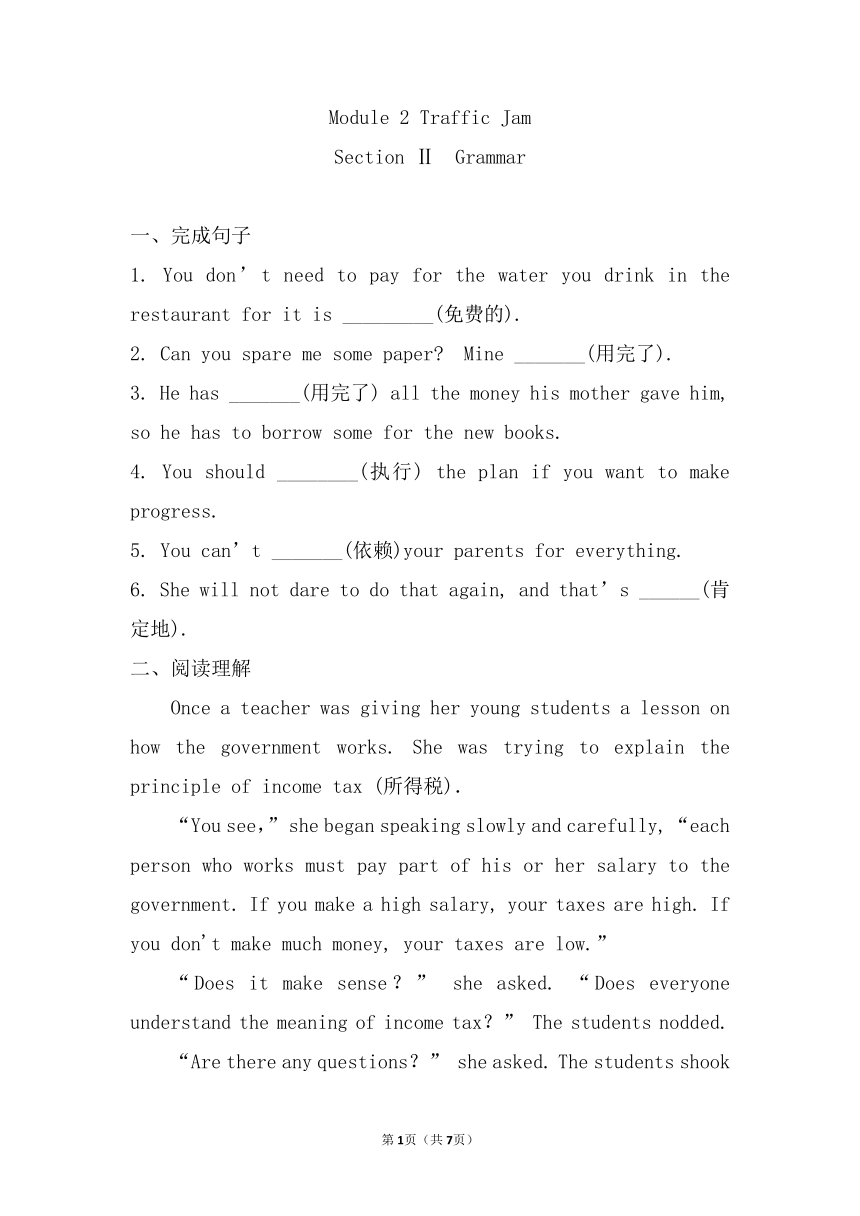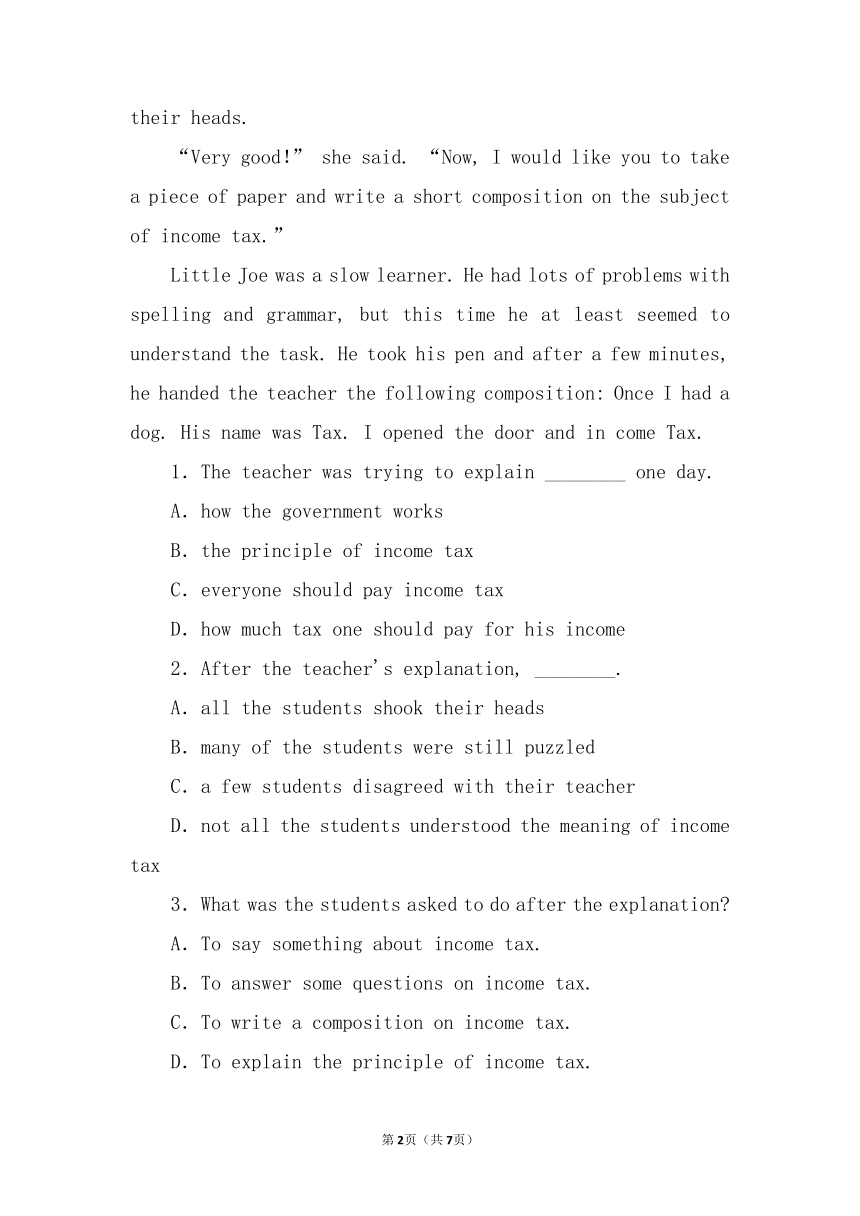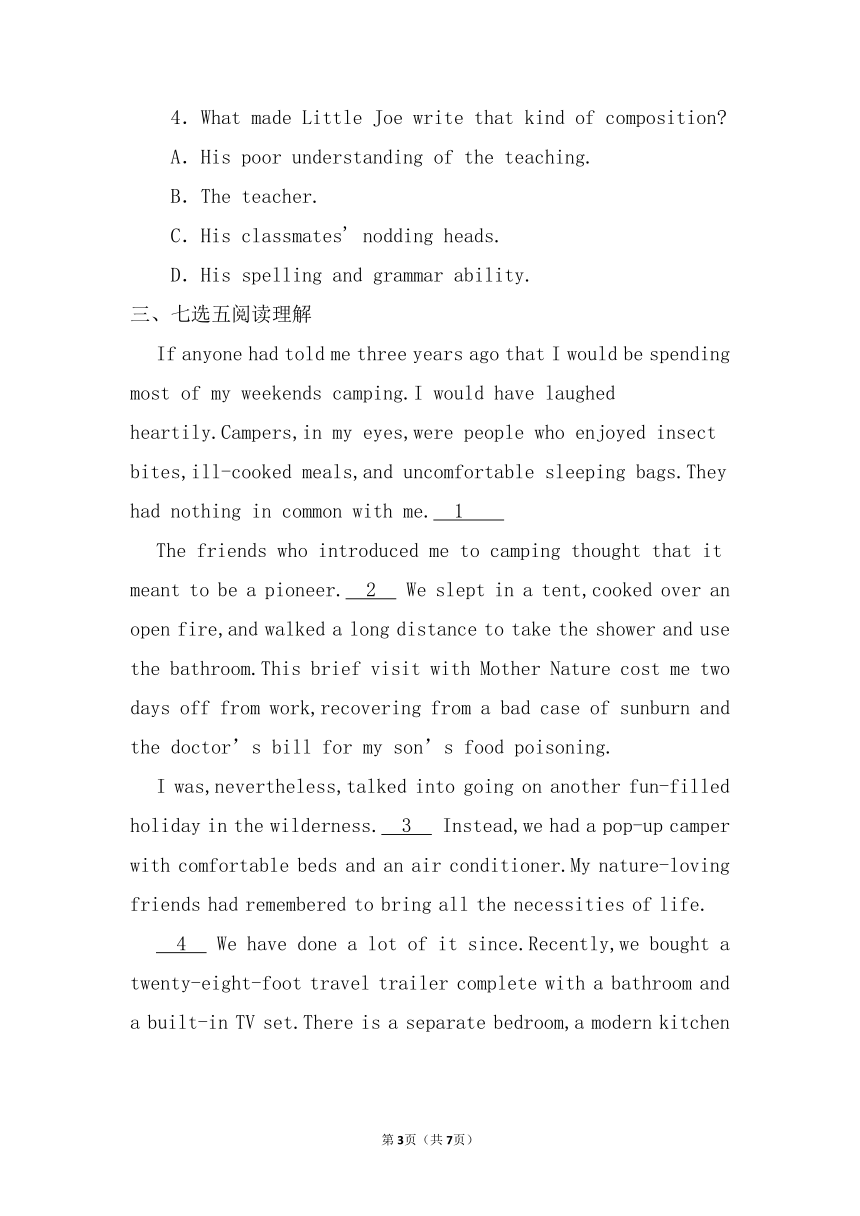外研版必修四:Module 2 Traffic Jam Grammar课后基础练(含答案)
文档属性
| 名称 | 外研版必修四:Module 2 Traffic Jam Grammar课后基础练(含答案) |  | |
| 格式 | doc | ||
| 文件大小 | 40.5KB | ||
| 资源类型 | 教案 | ||
| 版本资源 | 外研版 | ||
| 科目 | 英语 | ||
| 更新时间 | 2021-12-08 13:56:08 | ||
图片预览



文档简介
Module 2 Traffic Jam
Section Ⅱ Grammar
一、完成句子
1. You don’t need to pay for the water you drink in the restaurant for it is _________(免费的).
2. Can you spare me some paper Mine _______(用完了).
3. He has _______(用完了) all the money his mother gave him, so he has to borrow some for the new books.
4. You should ________(执行) the plan if you want to make progress.
5. You can’t _______(依赖)your parents for everything.
6. She will not dare to do that again, and that’s ______(肯定地).
二、阅读理解
Once a teacher was giving her young students a lesson on how the government works. She was trying to explain the principle of income tax (所得税).
“You see,” she began speaking slowly and carefully, “each person who works must pay part of his or her salary to the government. If you make a high salary, your taxes are high. If you don't make much money, your taxes are low.”
“Does it make sense?” she asked. “Does everyone understand the meaning of income tax?” The students nodded.
“Are there any questions?” she asked. The students shook their heads.
“Very good!” she said. “Now, I would like you to take a piece of paper and write a short composition on the subject of income tax.”
Little Joe was a slow learner. He had lots of problems with spelling and grammar, but this time he at least seemed to understand the task. He took his pen and after a few minutes, he handed the teacher the following composition: Once I had a dog. His name was Tax. I opened the door and in come Tax.
1.The teacher was trying to explain ________ one day.
A.how the government works
B.the principle of income tax
C.everyone should pay income tax
D.how much tax one should pay for his income
2.After the teacher's explanation, ________.
A.all the students shook their heads
B.many of the students were still puzzled
C.a few students disagreed with their teacher
D.not all the students understood the meaning of income tax
3.What was the students asked to do after the explanation
A.To say something about income tax.
B.To answer some questions on income tax.
C.To write a composition on income tax.
D.To explain the principle of income tax.
4.What made Little Joe write that kind of composition
A.His poor understanding of the teaching.
B.The teacher.
C.His classmates' nodding heads.
D.His spelling and grammar ability.
三、七选五阅读理解
If anyone had told me three years ago that I would be spending most of my weekends camping.I would have laughed heartily.Campers,in my eyes,were people who enjoyed insect bites,ill-cooked meals,and uncomfortable sleeping bags.They had nothing in common with me. 1
The friends who introduced me to camping thought that it meant to be a pioneer. 2 We slept in a tent,cooked over an open fire,and walked a long distance to take the shower and use the bathroom.This brief visit with Mother Nature cost me two days off from work,recovering from a bad case of sunburn and the doctor’s bill for my son’s food poisoning.
I was,nevertheless,talked into going on another fun-filled holiday in the wilderness. 3 Instead,we had a pop-up camper with comfortable beds and an air conditioner.My nature-loving friends had remembered to bring all the necessities of life.
4 We have done a lot of it since.Recently,we bought a twenty-eight-foot travel trailer complete with a bathroom and a built-in TV set.There is a separate bedroom,a modern kitchen with a refrigerator.The trailer even has matching carpet and curtains.
5 It must be true that sooner or later,everyone finds his or her way back to nature.I recommend that you find your way in style.
A.This time there was no tent.
B.Things are going to be improved.
C.The trip they took me on was a rough one.
D.I was to learn a lot about camping since then,however.
E.I must say that I have certainly come to enjoy camping.
F.After the trip,my family became quite interested in camping.
G.There was no shade as the trees were no more than 3 feet tall.
四、语法填空
We communicate with more than just spoken and 1. (write) words. We see examples of unconscious body language very often, yet there is also “learned” body language, which varies from culture to culture.
So far, every culture 2. (develop) a formal way to greet 3.
(stranger), to show them we are not aggressive. 4. (traditional), Europeans and Americans shake hands with the right hand. They also shake hands when they make 5. deal. Greetings in Asian countries do not involve
6. (touch) the other person. In China, when we greet someone, we put the left hand over the right and bow slightly. Muslims give a “salaam”, 7.
they touch their heart, mouth and forehead. Hindus join their hands and bow their heads 8. respect. Today American youths often greet each other with the 9. (express), “Give 10. (I) five! ” Body language is fascinating for anyone to study. People give away much more by their gestures than by their words.
一、完成句子
1.free of charge
2.has run out
3.run out of
4.carry out
5.rely on
6.for sure
二、阅读理解
1.B 细节理解题。根据文章第一段的“to explain the principle of income tax(所得税)”可确定答案。
2.D 推理判断题。由文章内容可知,尽管老师对于什么是“income tax”作出了解释,尽管乔认为自己理解了老师所说的概念,但通过他的作文可以看出,他并没有理解老师在说什么,由此可确定答案为D。
3.C 细节理解题。根据倒数第二段的“write a short composition on the subject of income tax”以及最后一段的“composition”可知,老师要求学生们写一篇关于“income tax”的作文。
4.A 推理判断题。根据乔写的内容可以看出,他将“income tax”理解成了“in come Tax”,他认为Tax是个名字,由此可知他理解力较差。
三、七选五阅读理解
1~5 DCAFE
四、语法填空
1. written。考查形容词作定语及固定搭配。句意: 我们不仅仅靠口语和书面语言交流。“written words”为固定搭配, 意为“书面语, 书面”。故本空填形容词written。
2. has developed。考查现在完成时。句意: 到目前为止, 每种文化都形成了一种正式的方式来问候陌生人。时间状语“so far”意为“到目前为止”应用现在完成时。本句的主语every culture是单数, 故填 has developed。
3. strangers。考查名词的数。名词前无冠词, 应当用其复数形式表示泛指。
4. Traditionally。考查副词作状语。句意: 传统上, 欧洲人和美国人用右手握手。分析句子可知, 空格处在句中作状语, 修饰后面的整个句子, 此时要用副词, 故填副词Traditionally。
5. a。考查不定冠词及固定搭配。句意: 他们做交易时也会握手。“make a deal”为固定搭配, 意为“成交; 达成交易”, 故空格处填不定冠词a。
6. touching。考查固定用法。句意: 在亚洲国家问候不涉及触摸对方。“involve (in) doing. . . ”为固定用法, 意为“涉及, 卷入, 牵扯到……”, 其中的in可省略, 后面要填动词的ing形式, 故空格处填touching。
7. where。考查定语从句。句意: 穆斯林的“salaam”(行额手礼), 在这个礼节里他们会触碰他们的心、嘴和前额。分析句子可知, 本句是定语从句, 其中的“salaam” 是先行词, 在定语从句中作抽象的地点, 即in a “salaam”, 此时可填副词where。故填where。
8. in/with。考查固定用法。句意: 印度教徒双手合十, 恭敬地低下头。 分析句子可知, 空格处与respect一起在句中作状语, 修饰动词bow their heads。“in /with+名词”相当于一个副词, 所以“with/in respect”意为“恭敬地, 尊敬地”在句中作状语, 故本空可填in/with。
9. expression。考查词性转换。空格前有定冠词, 且在句中作介词的宾语, 应当用名词。
10. me。考查语境及宾格。句意: 今天美国的年轻人经常用这样的方式来打招呼: “Give me five! ”。分析句子可知, 空格处在句中作动词give的宾语, 因此要用I的宾格形式me, 故填me。
第9页(共9页)
Section Ⅱ Grammar
一、完成句子
1. You don’t need to pay for the water you drink in the restaurant for it is _________(免费的).
2. Can you spare me some paper Mine _______(用完了).
3. He has _______(用完了) all the money his mother gave him, so he has to borrow some for the new books.
4. You should ________(执行) the plan if you want to make progress.
5. You can’t _______(依赖)your parents for everything.
6. She will not dare to do that again, and that’s ______(肯定地).
二、阅读理解
Once a teacher was giving her young students a lesson on how the government works. She was trying to explain the principle of income tax (所得税).
“You see,” she began speaking slowly and carefully, “each person who works must pay part of his or her salary to the government. If you make a high salary, your taxes are high. If you don't make much money, your taxes are low.”
“Does it make sense?” she asked. “Does everyone understand the meaning of income tax?” The students nodded.
“Are there any questions?” she asked. The students shook their heads.
“Very good!” she said. “Now, I would like you to take a piece of paper and write a short composition on the subject of income tax.”
Little Joe was a slow learner. He had lots of problems with spelling and grammar, but this time he at least seemed to understand the task. He took his pen and after a few minutes, he handed the teacher the following composition: Once I had a dog. His name was Tax. I opened the door and in come Tax.
1.The teacher was trying to explain ________ one day.
A.how the government works
B.the principle of income tax
C.everyone should pay income tax
D.how much tax one should pay for his income
2.After the teacher's explanation, ________.
A.all the students shook their heads
B.many of the students were still puzzled
C.a few students disagreed with their teacher
D.not all the students understood the meaning of income tax
3.What was the students asked to do after the explanation
A.To say something about income tax.
B.To answer some questions on income tax.
C.To write a composition on income tax.
D.To explain the principle of income tax.
4.What made Little Joe write that kind of composition
A.His poor understanding of the teaching.
B.The teacher.
C.His classmates' nodding heads.
D.His spelling and grammar ability.
三、七选五阅读理解
If anyone had told me three years ago that I would be spending most of my weekends camping.I would have laughed heartily.Campers,in my eyes,were people who enjoyed insect bites,ill-cooked meals,and uncomfortable sleeping bags.They had nothing in common with me. 1
The friends who introduced me to camping thought that it meant to be a pioneer. 2 We slept in a tent,cooked over an open fire,and walked a long distance to take the shower and use the bathroom.This brief visit with Mother Nature cost me two days off from work,recovering from a bad case of sunburn and the doctor’s bill for my son’s food poisoning.
I was,nevertheless,talked into going on another fun-filled holiday in the wilderness. 3 Instead,we had a pop-up camper with comfortable beds and an air conditioner.My nature-loving friends had remembered to bring all the necessities of life.
4 We have done a lot of it since.Recently,we bought a twenty-eight-foot travel trailer complete with a bathroom and a built-in TV set.There is a separate bedroom,a modern kitchen with a refrigerator.The trailer even has matching carpet and curtains.
5 It must be true that sooner or later,everyone finds his or her way back to nature.I recommend that you find your way in style.
A.This time there was no tent.
B.Things are going to be improved.
C.The trip they took me on was a rough one.
D.I was to learn a lot about camping since then,however.
E.I must say that I have certainly come to enjoy camping.
F.After the trip,my family became quite interested in camping.
G.There was no shade as the trees were no more than 3 feet tall.
四、语法填空
We communicate with more than just spoken and 1. (write) words. We see examples of unconscious body language very often, yet there is also “learned” body language, which varies from culture to culture.
So far, every culture 2. (develop) a formal way to greet 3.
(stranger), to show them we are not aggressive. 4. (traditional), Europeans and Americans shake hands with the right hand. They also shake hands when they make 5. deal. Greetings in Asian countries do not involve
6. (touch) the other person. In China, when we greet someone, we put the left hand over the right and bow slightly. Muslims give a “salaam”, 7.
they touch their heart, mouth and forehead. Hindus join their hands and bow their heads 8. respect. Today American youths often greet each other with the 9. (express), “Give 10. (I) five! ” Body language is fascinating for anyone to study. People give away much more by their gestures than by their words.
一、完成句子
1.free of charge
2.has run out
3.run out of
4.carry out
5.rely on
6.for sure
二、阅读理解
1.B 细节理解题。根据文章第一段的“to explain the principle of income tax(所得税)”可确定答案。
2.D 推理判断题。由文章内容可知,尽管老师对于什么是“income tax”作出了解释,尽管乔认为自己理解了老师所说的概念,但通过他的作文可以看出,他并没有理解老师在说什么,由此可确定答案为D。
3.C 细节理解题。根据倒数第二段的“write a short composition on the subject of income tax”以及最后一段的“composition”可知,老师要求学生们写一篇关于“income tax”的作文。
4.A 推理判断题。根据乔写的内容可以看出,他将“income tax”理解成了“in come Tax”,他认为Tax是个名字,由此可知他理解力较差。
三、七选五阅读理解
1~5 DCAFE
四、语法填空
1. written。考查形容词作定语及固定搭配。句意: 我们不仅仅靠口语和书面语言交流。“written words”为固定搭配, 意为“书面语, 书面”。故本空填形容词written。
2. has developed。考查现在完成时。句意: 到目前为止, 每种文化都形成了一种正式的方式来问候陌生人。时间状语“so far”意为“到目前为止”应用现在完成时。本句的主语every culture是单数, 故填 has developed。
3. strangers。考查名词的数。名词前无冠词, 应当用其复数形式表示泛指。
4. Traditionally。考查副词作状语。句意: 传统上, 欧洲人和美国人用右手握手。分析句子可知, 空格处在句中作状语, 修饰后面的整个句子, 此时要用副词, 故填副词Traditionally。
5. a。考查不定冠词及固定搭配。句意: 他们做交易时也会握手。“make a deal”为固定搭配, 意为“成交; 达成交易”, 故空格处填不定冠词a。
6. touching。考查固定用法。句意: 在亚洲国家问候不涉及触摸对方。“involve (in) doing. . . ”为固定用法, 意为“涉及, 卷入, 牵扯到……”, 其中的in可省略, 后面要填动词的ing形式, 故空格处填touching。
7. where。考查定语从句。句意: 穆斯林的“salaam”(行额手礼), 在这个礼节里他们会触碰他们的心、嘴和前额。分析句子可知, 本句是定语从句, 其中的“salaam” 是先行词, 在定语从句中作抽象的地点, 即in a “salaam”, 此时可填副词where。故填where。
8. in/with。考查固定用法。句意: 印度教徒双手合十, 恭敬地低下头。 分析句子可知, 空格处与respect一起在句中作状语, 修饰动词bow their heads。“in /with+名词”相当于一个副词, 所以“with/in respect”意为“恭敬地, 尊敬地”在句中作状语, 故本空可填in/with。
9. expression。考查词性转换。空格前有定冠词, 且在句中作介词的宾语, 应当用名词。
10. me。考查语境及宾格。句意: 今天美国的年轻人经常用这样的方式来打招呼: “Give me five! ”。分析句子可知, 空格处在句中作动词give的宾语, 因此要用I的宾格形式me, 故填me。
第9页(共9页)
